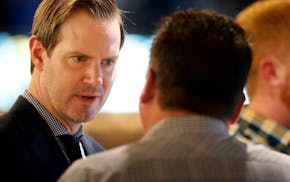The Commissioner of Baseball and I had a chat Monday afternoon. This came after messages from a couple of sources reached my cell phone, including from Twins President Dave St. Peter.
"The man in Milwaukee would like to speak to you," St. Peter said.
I assumed this to be Bud Selig, and the subject to be a column offered in Sunday's Star Tribune that it was time for the commissioner to step aside in favor of a replacement ready to "declare war on the cheats and restore trust in the Tarnished Old Game."
Some of what Selig had to say in Monday's 30-minute dissertation was either off the record or not suitable for daily newspaper consumption. Most of what I had to say in brief responses was "uh," "er," or "ah."
This lopsided conversation took place a few hours before ESPN ran an interview in which Alex Rodriguez admitted to being a steroids user during three seasons (2001-03) with Texas.
This was an offshoot of the story that broke on Sports Illustrated's website Saturday revealing A-Rod had tested positive for two steroids in 2003.
A more in-depth investigative piece will appear in SI's print edition today. Apparently, there will be greater detail on another bombshell that was part of SI's website report:
The allegation that Gene Orza, the CEO of the Major League Baseball Players Association, tipped off A-Rod in September 2004 that he would be tested for steroids later that month.
Certainly, if today's SI investigative report includes further information that Orza went so far as to tip off players, we will know that Selig was battling an MLBPA leadership without conscience when it came to performance enhancers.
On Monday, Selig said: "I didn't have the right to test big-leaguers under the collective bargaining agreement at the time, so we started with minor leaguers in 2001. We've had an exhaustive minor league testing program that has been tremendously successful."
It took until 2003 to get the MLBPA to agree to a "survey" test for steroids. If the percentage of players testing positive was higher than 5 percent, then a formal testing program would begin in 2004.
There were 104 players testing positive -- over the 5 percent threshold. There are now reports that the reason the records of those anonymous tests were not destroyed, as planned, was because Orza wanted to look for "false positives" and get the percentage under 5 to prevent the implementation of a testing program.
The Feds raided two labs in the search of the records late in 2004, and now there's a list out there with names ready to have the scarlet "S" attached to them. One was A-Rod, as SI reporter Selena Roberts discovered while researching a book on him.
Sunday's column that set off Selig insisted baseball needed a commissioner to "make heads roll" -- and Bud wasn't that guy.
"I have spent the last decade working on this harder than anything else in the game," Selig said. "We now have the most thorough testing program in professional sports.
"I'm confident that with minor league and now major league testing that steroids are nearly eradicated from our game. We're testing for amphetamines, and other leagues don't do that.
"HGH -- that's a problem for everyone, including the Olympics. But we're spending millions in the effort to find a reliable test. We also spent millions on George Mitchell's report, which took 19 months and was an outstanding look at steroids in our sport.
"So, I ask: What do you want?"
I told Selig that what wasn't wanted was to see Alex Rodriguez in the Yankees lineup on Opening Day, with no consequence for his cheating beyond louder boos.
Selig reminded that the '03 tests were supposed to be confidential and without repercussions for players. "The Commissioner of Baseball has a lot of power, but he's not above the law," he said.
What if the commissioner summons A-Rod to his office to deal with this disgrace to the game?
"If I tell him to be in my office, he will be there," Selig said.
Patrick Reusse can be heard 5:30-9 a.m. weekdays on AM-1500 KSTP. • preusse@startribune.com

Reusse: Success on court helped Timberwolves do strong business

Reusse: Taylor's story. 'I just bought the Minnesota Timberwolves.'

Reusse: Back from injury, Towns doesn't have to carry load


